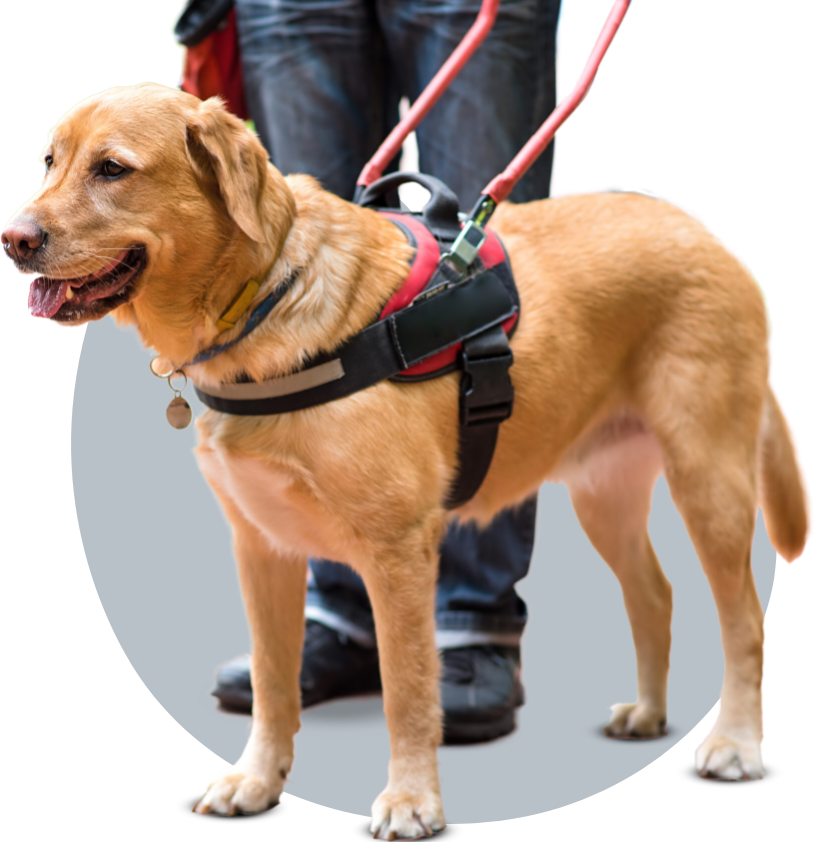WHICH SERVICE "TYPE" SHOULD I SELECT?
Guide: This type is regarded as a "working service dog". Choose this type if you experience vision problems and your dog is trained to guide you in public settings.
Hearing Alert: This type is regarded as a "working service dog". Choose this type if your dog is trained to alert you to sounds that you are unable to hear or identify, such as alarm clocks, doorbells, telephones, automobile sounds, and other important sounds you have trouble identifying.
In Training: If your dog is being trained to become a service dog, but isn't quite ready to qualify for registration, "In Training" is the service type you should select. Although service dogs that are in training have no federally protected rights, many public places allow you access with your service dog in training.
Medical Assist: This type is regarded as a "working service dog". Choose this type if your dog is trained to assist you when experiencing a physical situation in which you can't perform a major life task for yourself (retrieve items, open doors, turn on lights, etc.).
Mobility: This type is regarded as a "working service dog". Choose this type if your dog is trained or able to provide stability and support for substantial balance or walking problems because of a physical disability.
PSA (Psychiatric Service Animal): This type is regarded as a "working service dog". Choose this type if your psychiatric or emotional disability substantially limits your ability to perform a major life task and your dog is trained to perform or help perform the task for you. A letter from a licensed therapist or psychiatrist that clearly indicates this is required.
Seizure Alert: This type is regarded as a "working service dog". Choose this type if your dog is trained or able to either predict a seizure or to get assistance from another person at the onset of a seizure.
SERVICE DOG VS. EMOTIONAL SUPPORT ANIMAL
An Emotional Support Animal (ESA) is an animal that, by its very presence, mitigates the emotional or psychological symptoms associated with a handler's condition or disorder. The animal does NOT need to be trained to perform a disability-specific task. All domesticated animals (dogs, cats, birds, reptiles, hedgehogs, rodents, mini-pigs, etc.) may serve as an ESA. The only legal protections an Emotional Support Animal has are 1) to fly with their emotionally or psychologically disabled handler in the cabin of an aircraft and 2) to qualify for no-pet housing. No other public or private entity (motels, restaurants, stores, etc.) is required to allow your ESA to accompany you and in all other instances, your ESA has no more rights than a pet.
You'll also need to be prepared to present a letter to airlines and property managers from a licensed mental health professional stating that you are emotionally disabled and that he/she prescribes for you an emotional support animal.
If you do not have a letter of prescription and are unable to get one, we recommend that you consider Chilhowee Psychological Services. This agency offers legitimate psychometric testing, assessment, diagnosis, AND a letter of prescription from a licensed mental health professional. Click here to view their website.
A final note: Some animals are innately able to predict the onset of a physical or psychiatric event or crisis, effectively enabling the handler to prevent or minimize the event. This is an ability that usually cannot be trained - some animals are simply born with the ability to sense the onset of the event. These types of animals, although not otherwise task-trained, are considered "working" service animals.
